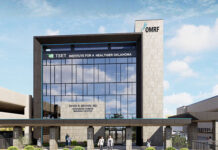Remember being told as a kid that eating your carrots would improve your eyesight? While a diet containing carrots promotes good vision, your eyes may benefit even more by eating broccoli, kale or Brussels sprouts.
That’s the assessment of Oklahoma Medical Research Foundation scientist Scott Plafker, Ph.D., who recently found that a compound in cruciferous vegetables shows the potential to prevent age-related macular degeneration.
In research models, the compound sulforaphane preserved the function of light-sensitive cells in the retina. These cells, called cones, are responsible for color vision by sending signals to the brain, which then translates the signals into color.
Macular degeneration occurs when these cells die, causing blind spots and blurry or distorted central vision. It can worsen over time, affecting a person’s ability to read, drive and recognize faces.
The most common treatment for the eye disorder is “handfuls of vitamins and antioxidant supplements,” Plafker said. Sulforaphane is a natural antioxidant, he said, but it typically is not part of the suggested cocktail for macular degeneration.
“This compound has previously shown the ability to help our cells defend themselves from oxidative stress,” Plafker said. “In these experiments, sulforaphane provided that defense to the retina.”
Sulforaphane is found in cauliflower, radishes, broccoli and other members of the cabbage family. It also is available as a supplement, but Plafker said research has shown it offers more value in its natural form, whether fresh, frozen or canned.
Scientists have conducted numerous clinical trials testing sulforaphane’s benefits on medical issues ranging from autism and schizophrenia to enlarged ovaries and prostate cancer. Plafker’s lab was the first to demonstrate its potential to recover cone function.
Macular degeneration is the leading cause of irreversible vision loss in older adults, affecting more than 10 million people in the U.S., according to the American Macular Degeneration Foundation. The risk increases with age. For those 75 or older, the risk of developing macular degeneration is 1 in 3.
“Dr. Plafker’s findings raise the intriguing possibility that a well-known compound present in many vegetables may protect against vision loss as people age,” said OMRF Vice President of Research Rod McEver, M.D. “Considering there are no treatments for most people with macular degeneration, this is an especially compelling discovery.”
More research is needed to better understand how and why cells in the eye benefit from sulforaphane, Plafker said, and whether that benefit extends universally or only to a subset of potential macular degeneration patients.
But for now, Plafker said, lean into green. “A diet rich in vegetables like broccoli, kale and cabbage has health benefits as far as the eye can see.”
The findings were published in the journal Molecular Vision. The research was supported by grant 1 R01EY024944-01A1 from the National Eye Institute, part of the National Institutes of Health, and grants from the Oklahoma Center for the Advancement of Science and Technology and the Presbyterian Health Foundation. Scientists at the University of Alabama, Birmingham, contributed to the research.















